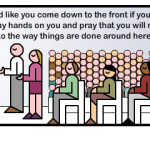We run our website the way we wished the whole internet worked: we provide high quality original content with no ads. We are funded solely by your direct support. Please consider supporting this project.

Dismembered: The Church and Individualism
Those God has saved are called to be the church, not go to church. This distinction is vitally important. The church consists of all those who entered into the new covenant that Jesus inaugurated by putting their trust in him and surrendering their life over to him.
Yet, the church is much more than a collection of individuals. Rather, when a person surrenders to Christ, the Spirit of God incorporates them into a living organism that the New Testament calls “the body of Christ” (1 Cor 12:27). Each newly incorporated individual is organically related to other members of the body the way a person’s foot is related to their hand, for example, or the way their eyes are related to their ears (1 Cor 12). In other words, each member of the body of Christ is related to every other member as part of a single, living organism.
This is difficult for many in Western culture to grasp, largely because our culture is intensely individualistic. We tend to define individuals over and against others rather than in relationship to others. We thus tend to view the individuals that comprise a given social group (family, church, nation) as more real than the social group itself. In our view, individuals can join and leave a social group without significantly affecting either the individual or the social group.
This is far from the view of the Bible (as well as most other cultures). The Bible views individuals and social groups as equally real. In fact, biblically speaking, individuals and social groups are two sides of the same coin. Who we are individually is inextricably associated with who we belong to.
This is why the Bible sometimes treats families, tribes, nations and even the whole human race as though they were single individuals. What happens to any individual affects the whole, and what happens to the whole affects the individual. Paul reflects this perspective when he talks about our identity “in Adam” and “in Christ” (1 Cor 15:22). There’s an important sense in which all humans formed a single organic entity “in Adam” and now are being formed into a new, redeemed, single organic entity “in Christ.”
Paul also reflects this perspective when he speaks about the church. When an individual surrenders to Christ and becomes part of God’s betrothed bride, they become organically united with other disciples. The idea of a disciple being unattached to the body of Christ is unheard of in the New Testament. To be “in Christ” means one is part of the body over which Christ is head (Col 1:18). From a New Testament perspective, a Christian can no more live unattached to the body of Christ than (say) a finger can live unattached to a hand.
Because we in the West tend to mistakenly think of church as a weekend gathering in a special religious building (based on the ideas discussed in yesterday’s post), many mistakenly assume that when Paul addressed letters to “the church” in a certain city (e.g. at Corinth, Ephesus.), he had in mind a single body of people who gathered together as a rather large group once a week. In reality, the regional churches Paul wrote to consisted of a number of smaller groups who usually met in each other’s homes. We know from archeology that homes of this period rarely could accommodate more than a couple dozen people, which means that the house churches early Christians gathered in had to remain quite small.
This isn’t to say early Christians saw anything wrong with large group gatherings, such as the kind Jesus attracted. When possible, Christians throughout a region gathered together for fellowship and worship (Ac 1:13-15, 2:46, 5:12). Yet, the primary unit where individuals practically participated with others as the body of Christ was a small house church.
This is much more than a curious historical fact, for everything the New Testament has to say about church life presupposes that disciples are living in close relationships with other disciples. For example, we’re told to admonish one another (Col 3:16), carry each other’s burdens (Gal 6:2), and consider others better than ourselves (Phil 2:3). And we’re encouraged to pray for one another (James 5:16), encourage one another (1 Thes 1:18), forgive one another (Col 3:13), and submit to one another (Eph 5:21). These and similar instructions presuppose followers of Jesus are sharing life together in deep ways. The level of trust involved in these “one another’s” isn’t something we generally have with mere acquaintances.
Very few people in America have relationships like this, which is why very few American Christians practice many of the New Testament’s 59 “one-another’s” on a regular basis. There’s simply no opportunity to develop the kind of relationships with others in which the “one another’s” are appropriate if your idea of church is getting together with people you hardly know once a week for a religious service that allows for little if any meaningful social interaction. Conversely, when people try to apply some of the “one another’s” of the New Testament to people they aren’t in relationship with, it comes across as judgmental.
In this light, when we hear the New Testament’s teaching that we are members of the body of Christ, we need to understand that it’s assuming we will be participating in communities that are cultivating deep and significant relationships. This is quite a challenge for the largely individualistic Western church today.
Photo credit: Mario Puristic via Unsplash
Category: General
Tags: Body of Christ, Church, House Churches, Individualism, Western Assumptions
Topics: The Church
Related Reading

“You” Means “Y’all”
Mrs Logic via Compfight Justin Hiebert over at Empowering Missional wrote a piece last week titled The Bible isn’t for you. Justin rightly points out that our individualistic mindset has caused us to misread huge portions of the Bible. He challenges us to read the Bible as a community rather than as individuals. It seems…

Leaders in the Revolution: An Invitation
Kevin Dooley via Compfight Network Exploration Meeting There is a growing movement of pastors, church planters, and churches around the globe who have become convinced that the center of the Gospel is a Jesus-looking God who calls his people to partner with him to advance a Jesus-looking kingdom. They sense that God is pouring out…

The Problem with Mixing Church & Government
Image by fusion-of-horizons via Flickr Some people insist that the only reason that neither Jesus nor anyone else in the first several centuries of the church tried to dominate the political system of their day was because they were a small minority of people living in a nondemocratic and hostile environment. By contrast, the argument goes,…

Does the Current Structure of the Church Marginalize and Suppress Lay Voices?
In this episode Greg discusses church organization and the current model of developing church leaders (as well as the nature of their role in the church). Links: Greg’s book: “The Myth of a Christian Nation” http://traffic.libsyn.com/askgregboyd/Episode_0035.mp3


